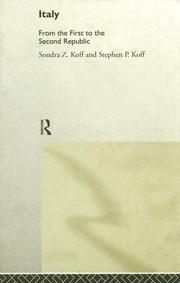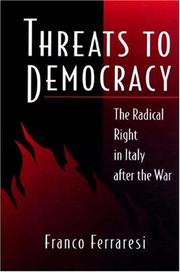| Listing 1 - 5 of 5 |
Sort by
|

ISBN: 1280334878 0203005368 0203170776 9780203170779 9780203005361 9781134643691 1134643691 9786610334872 6610334870 0415196639 0415196647 9780415196635 9780415196642 9781134643646 1134643640 9781134643684 1134643683 Year: 2000 Publisher: London ; New York : Routledge,
Abstract | Keywords | Export | Availability | Bookmark
 Loading...
Loading...Choose an application
- Reference Manager
- EndNote
- RefWorks (Direct export to RefWorks)
This textbook has been designed to provide students with an up-to-date and accessible introduction to the complexities of Italian politics during the 1990's. It will equip students with a sound understanding of the basics of Italian politics and government, and will provide clear and simple insights into the intricacies of Italian political behaviour. The comprehensive coverage includes: * an introduction to contemporary history, political geography and economic issues as well as Italian political values and attitudes. * a section on political behaviour which explores political part
Book
Year: 2019 Publisher: Baden-Baden Nomos Verlagsgesellschaft mbH & Co. KG
Abstract | Keywords | Export | Availability | Bookmark
 Loading...
Loading...Choose an application
- Reference Manager
- EndNote
- RefWorks (Direct export to RefWorks)
Politician Aldo Moro was abducted and killed in 1978 by the terrorist organization Red Brigades. The media then stylized Moro as a «state martyr». The volume deals with the highly topical question concerning the performativity of this concept in the tension between democratic state and terrorism and reconstructs a crucial phase of post-war time policy in Italy on the basis of media sources on the Moro case. What performs a term from Christian antiquity within modern socio-political discourses? What changes has the term "martyr" undergone in European religious and cultural history? On the basis of these questions, the study opens up an interdisciplinary theoretical horizon to understand the role of religious motives in socio-political con-texts. It brings a central new dimension to the secularization debate, which sees secularization as a new configuration of politics and religion.
Christian martyrs --- Political violence --- Political aspects. --- Religious aspects. --- Moro, Aldo, --- Assassination. --- Kidnapping. --- 1945-1976 --- Italy --- Politics and government --- Religion --- Politics --- Media --- Martyrdom --- Secularization --- Representation --- Performativity --- Aldo Moro

ISBN: 0691044996 9786612753138 1400822114 1282753134 1400811570 9781400811571 9780691044996 1400802210 1400802229 Year: 1996 Publisher: Princeton, N.J. Princeton University Press
Abstract | Keywords | Export | Availability | Bookmark
 Loading...
Loading...Choose an application
- Reference Manager
- EndNote
- RefWorks (Direct export to RefWorks)
This book represents the first systematic research by a social scientist on the radical right-wing movements in Italy since 1945. During the heyday of right-wing violence between 1969 and 1980, street aggressions, attacks, and murders were commonplace. These bloody episodes were assumed to be the work of fanatical bands of "political soldiers" and urban warriors loosely controlled by secret services and other covert groups, which used them as part of a "strategy of tension" pursued in domestic and international circles. Franco Ferraresi here acknowledges that these rightist groups were in fact permitted a certain amount of freedom, and even in some cases actually aided, in the hope that revulsion at terrorist tactics would have the effect of mobilizing public opinion in favor of existing political arrangements. However, he also studies the extent to which they operated as autonomous units, while he carefully considers the political heritage, the doctrines, and the ideology that motivated them. With the decline of violent activity on both extremes of the political spectrum in the early 1980's, the theory and practice so comprehensively discussed by Ferraresi seemed to have entered a dormant stage. Ferraresi, however, places in context the recent resurgence of neo-fascist forces in Italy, and of the so-called New Right throughout Europe, together with the rise of fundamentalism in many parts of the world.
Italiaanse sociale beweging --- Mouvement social italien --- Movimento sociale italiano --- Fascism --- Conservatism --- History --- Movimento sociale italiano. --- Italy --- Politics and government --- Conservativism --- Neo-conservatism --- New Right --- Right (Political science) --- MSI (Movimento sociale italiano) --- M.S.I. (Movimento sociale italiano) --- Political science --- Sociology --- Movimento sociale italiano-Destra nazionale --- 1945-1976 --- 1945 --- -Conservatism --- 20th century
Book
ISBN: 9462701083 9789462701083 9789461662224 946166222X Year: 2017 Volume: 20 Publisher: Leuven: Leuven university press,
Abstract | Keywords | Export | Availability | Bookmark
 Loading...
Loading...Choose an application
- Reference Manager
- EndNote
- RefWorks (Direct export to RefWorks)
The changing attitude of Catholic culture towards modernity. After decades of a problematic, if not plainly hostile, approach to modernity by Catholic culture, the 1960s marked the beginning of a new era. As the Church employed a more positive approach to the world, voices in the Catholic milieu embraced a radical perspective, channeling the need for social justice for the poor and the oppressed. The alternative and complementary world views of 'universalism' and 'liberation' would drive the engagement of Catholics for generations to come, shaping the idea of international community in Catholic culture. Because of its traditional connection with the papacy and because of its prominent role in the map of European progressive Catholicism, Italy stands out as an ideal case study to follow these dynamics. By locating the Italian scenario in a broader geographical frame, 'Universalism and Liberation' offers a new vantage point from which to investigate the social and political relevance of religion in an age of crisis.
C8 --- KADOC - Documentatie- en Onderzoekscentrum voor Religie, Cultuur en Samenleving (1977-) --- Ideologie en politiek --- C1 --- Kerken en religie --- Italië --- katholieke zuil --- 27 <45> "19" --- 27 <45> "19" Histoire de l'Eglise--Italië--20e eeuw. Periode 1900-1999 --- 27 <45> "19" Kerkgeschiedenis--Italië--20e eeuw. Periode 1900-1999 --- Histoire de l'Eglise--Italië--20e eeuw. Periode 1900-1999 --- Kerkgeschiedenis--Italië--20e eeuw. Periode 1900-1999 --- Church and social problems --- Eglise et problèmes sociaux --- Catholic Church. --- Eglise catholique --- Italy --- Italie --- Social conditions --- Conditions sociales --- Eglise et problèmes sociaux --- Christian church history --- History of Italy --- anno 1970-1979 --- anno 1960-1969 --- Christianity and international relations --- Liberation theology --- Universalism --- Catholic Church --- Politics and government --- Christianity and social problems --- Social problems and Christianity --- Social problems and the church --- Social problems --- Catholic Church and social problems --- Christianity and international relations - Catholic Church --- Church and social problems - Catholic Church --- Church and social problems - Italy --- Italy - Social conditions - 1945-1976 --- Italy - Politics and government - 1945-1976
Book
ISBN: 2110871636 2111621013 9782110871633 Year: 1994 Volume: *1 Publisher: Paris: Ministères de l'économie et du budget,
Abstract | Keywords | Export | Availability | Bookmark
 Loading...
Loading...Choose an application
- Reference Manager
- EndNote
- RefWorks (Direct export to RefWorks)
La chute du communisme et l’effondrement économique des pays de l’Est ont donné au Plan Marshall du relief, voire de l’actualité : les responsables économiques et politiques ne se lassent pas d’interroger, à la lumière de la nouvelle donne mondiale, ce transfert financier et idéologique qui contribua, en grande partie, au redressement de l’Europe d’après-guerre. Quarante-cinq ans plus tard, il était plus que temps de dresser un état sérieux de cette question, jamais traitée dans son ensemble. Les spécialistes - historiens, économistes, responsables politiques - qui ont participé au colloque international qui lui fut consacré à Bercy sous l’égide du Comité pour l’histoire économique et financière, livrent ici leurs études et leurs réflexions. Ne se limitant pas à l’Europe et aux États-Unis, mais débordant aussi sur l’Extrême-Orient, celles-ci couvrent tous les aspects du Plan Marshall : économiques, industriels, financiers, mais aussi politiques, diplomatiques ou idéologiques...
International economic relations --- Europe --- History of France --- anno 1700-1799 --- #BUAR:bibl.de Bock --- 339.96 <4> <73> --- politique economique --- planification economique --- histoire economique --- europe --- congres --- AA / International- internationaal --- 335.6 --- NBB congres --- economisch beleid --- economische planning --- economische geschiedenis --- europa --- congressen --- Liquidatie van de oorlogseconomie: economische demobilisatie en herstel. Marshall Plan. --- Histoire économique --- --1945-1950 --- --Plan Marshall --- --Colloque --- --1991 --- --Bercy --- 3478 --- Marshall Plan --- Congresses --- Congrès --- Economic conditions --- Conditions économiques --- Economic assistance [American ] --- 1945 --- -Congresses --- Internationale economische betrekkingen --- Europa --- Congresses. --- Liquidatie van de oorlogseconomie: economische demobilisatie en herstel. Marshall Plan --- --Marshall Plan --- Plan Marshall --- Colloque --- Bercy --- Economics --- History --- plan Marshall --- histoire économique --- après-guerre --- EUROPE --- MARSHALL (PLAN) --- FRANCE --- ITALIE --- BELGIQUE --- BULGARIE --- TCHECOSLOVAQUIE --- U.R.S.S. --- MONNET (JEAN), ECONOMISTE FRANCAIS, 1888-1979 --- UNION EUROPEENNE DES PAIEMENTS --- ALLEMAGNE --- PAYS-BAS --- BENELUX --- SUISSE --- TURQUIE --- GRECE --- NORVEGE --- JAPON --- COREE --- CONDITIONS ECONOMIQUES --- 20E SIECLE --- HISTOIRE --- POLITIQUE ET GOUVERNEMENT --- 1944-1958 --- 1945-1976 --- 1944-1951 --- 1878-1944 --- 1936-1953 --- BIOGRAPHIE --- RELATIONS EXTERIEURES --- ETATS UNIS --- BIOGRAPHIES --- -CONDITIONS ECONOMIQUES --- -POLITIQUE ECONOMIQUE --- 19E-20E SIECLES --- IMPOT SUR LE REVENU --- IMPOTS --- FINANCES PUBLIQUES --- REVENUS DE L'ETAT --- DROIT FISCAL --- 18E SIECLE --- ADMINISTRATION ET PROCEDURE --- ANCIEN REGIME --- POLITIQUE FISCALE --- POLITIQUE ECONOMIQUE
| Listing 1 - 5 of 5 |
Sort by
|

 Search
Search Feedback
Feedback About UniCat
About UniCat  Help
Help News
News